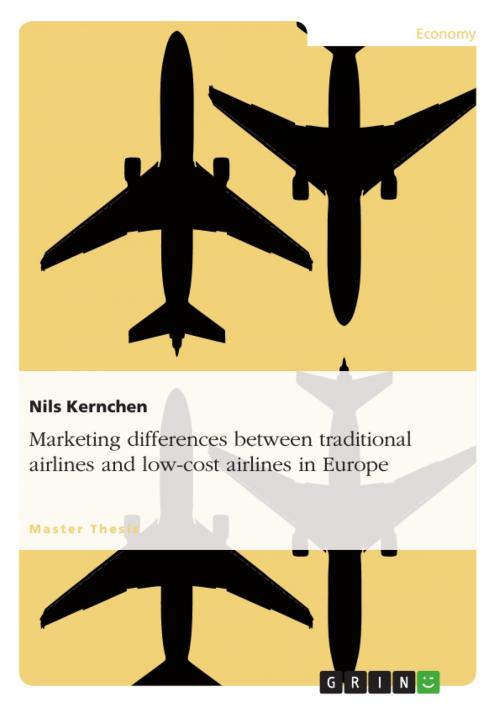Marketing differences between traditional airlines and low-cost airlines in Europe
Business & Finance, Marketing & Sales| Author: | Nils Kernchen | ISBN: | 9783638350518 |
| Publisher: | GRIN Publishing | Publication: | February 15, 2005 |
| Imprint: | GRIN Publishing | Language: | English |
| Author: | Nils Kernchen |
| ISBN: | 9783638350518 |
| Publisher: | GRIN Publishing |
| Publication: | February 15, 2005 |
| Imprint: | GRIN Publishing |
| Language: | English |
Master's Thesis from the year 2004 in the subject Business economics - Marketing, Corporate Communication, CRM, Market Research, Social Media, grade: A-, ESG Management School, Paris, 33 entries in the bibliography, language: English, abstract: European Media is writing daily articles about the situation of the European airline business. The European airline market is, at the moment, with all the important changes and actual turbulences, the most dynamic industry sector. Some of these changes are: The creation of new low-cost airlines in Europe, like Germanwings (Germany), Volareweb (Italy), and Sky Europe (Slovakia); The disappearance and bankruptcy of airlines, such as V-Bird (Netherlands) and Swissair; Air France merges with KLM to become the worlds biggest airline group; A significant increase of purchases of airplanes by Arabic airlines. This thesis focuses on the low-cost airlines, which arrived in Europe during the last 10 years and changed micro and macro environment of the airline business. Low-cost airlines like Ryanair and EasyJet make big profits while Alitalia, British Airways, Air France, and Lufthansa are having enormous problems. The general opinion is that low-cost airlines are successful because of its lower cost in production, and therefore of its lower price they can offer to the customers. The thesis will show that the cost factor is not the only reason for the success of low-cost airlines: 'Being cheap is not enough' The objective of the thesis is to find other reasons which explain the success of low-cost airlines by analysing the marketing development of European low-cost airlines with its strategies, positioning, customer satisfaction etc. Of special interest: The question how the low-cost trend changes the marketing and the behaviour of the traditional airlines and how do the customers react. As reaction to this trend the traditional airlines are reducing at the moment costs in salary, distribution, maintenance etc. to survive. This is not enough. The thesis mentions marketing ideas and possibilities of how to compete against low-cost airlines, either by copying successful marketing methods of these airlines or by finding new innovative methods, fresh ideas and a new positioning. The main objectives for my thesis are: Is the success of low-cost airlines only a short term event or is it a successful business marketing concept? Are the traditional airlines in danger? Is the Low Cost concept the better concept? What can traditional airlines learn from the marketing methods of low-cost airlines?
Master's Thesis from the year 2004 in the subject Business economics - Marketing, Corporate Communication, CRM, Market Research, Social Media, grade: A-, ESG Management School, Paris, 33 entries in the bibliography, language: English, abstract: European Media is writing daily articles about the situation of the European airline business. The European airline market is, at the moment, with all the important changes and actual turbulences, the most dynamic industry sector. Some of these changes are: The creation of new low-cost airlines in Europe, like Germanwings (Germany), Volareweb (Italy), and Sky Europe (Slovakia); The disappearance and bankruptcy of airlines, such as V-Bird (Netherlands) and Swissair; Air France merges with KLM to become the worlds biggest airline group; A significant increase of purchases of airplanes by Arabic airlines. This thesis focuses on the low-cost airlines, which arrived in Europe during the last 10 years and changed micro and macro environment of the airline business. Low-cost airlines like Ryanair and EasyJet make big profits while Alitalia, British Airways, Air France, and Lufthansa are having enormous problems. The general opinion is that low-cost airlines are successful because of its lower cost in production, and therefore of its lower price they can offer to the customers. The thesis will show that the cost factor is not the only reason for the success of low-cost airlines: 'Being cheap is not enough' The objective of the thesis is to find other reasons which explain the success of low-cost airlines by analysing the marketing development of European low-cost airlines with its strategies, positioning, customer satisfaction etc. Of special interest: The question how the low-cost trend changes the marketing and the behaviour of the traditional airlines and how do the customers react. As reaction to this trend the traditional airlines are reducing at the moment costs in salary, distribution, maintenance etc. to survive. This is not enough. The thesis mentions marketing ideas and possibilities of how to compete against low-cost airlines, either by copying successful marketing methods of these airlines or by finding new innovative methods, fresh ideas and a new positioning. The main objectives for my thesis are: Is the success of low-cost airlines only a short term event or is it a successful business marketing concept? Are the traditional airlines in danger? Is the Low Cost concept the better concept? What can traditional airlines learn from the marketing methods of low-cost airlines?















